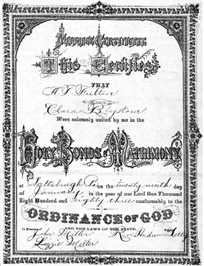 This post started as a comment on my friend Ambrose's blog but it was getting long enough to justify a post. Check it out for context.
This post started as a comment on my friend Ambrose's blog but it was getting long enough to justify a post. Check it out for context.
Let's start with this: marriage cannot be defined by the biological prospect of having children, because that would rule out sterile couples and menopausal women. As simple as that.
On adoption, Ambrose said:
"it seems likely that the child raised by a homosexual couple will have at least some issues similar to other children who are raised without a mother or without a father"
What are those issues? Is there evidence of that? Rigorous studies on those problems exist, we don't have to guess.
I'm glad that Ambrose does mention that:
"It is [commitment] not infatuation, not sex, not even children--that is essential to marriage and is also its primary joy."
That I can agree with if we are speaking of marriage in our time and regions, but we should also not forget that in the past, and in many regions of the world, marriage has been and still is mostly arranged and more a matter of business than consensual commitment. But let's pass on that.
Then Ambrose says:
"it must be understood that this is an unbreakable, unquestionable lifetime commitment that no one, not even those who enter into it, can break".
That, I must say, sounds to me like an archaic and patriarchal vision of things. Surely Ambrose would agree that if a woman is routinely beaten by her husband, that marriage should be broken? I agree on the commitment, but I also think that a commitment can only be meaningful if it is consensual and if there is a way out. Otherwise, you have built a prison, not a marriage. At least not a modern one (oh, yes, I do think these concepts must evolve as our understanding of ethics does (and it does)). That does not mean it's subject to the "whims of passion" as Ambrose says. Actually, I find this slightly insulting: I do not remain my wife's partner because we're married. That's backwards. I am married to my wife because we have had and continue to have an adult relationship based on love, trust and shared values. That marriage will last because we don't see an end to these things, not because marriage is sacred. That commitment that Ambrose speaks of is not coming out of nowhere. It's not marriage that is creating it, marriage is only the representation and consequence of it, it existed before.
I would go so far as attributing the higher rate of divorces in the most religious parts of the US to sexual repression (if you can't experiment freely with sex, you are more likely to confuse lust with love), silly notions about contraception and an archaic notion of ownership of women by men that still permeates religious thought (but that I'm not accusing Ambrose of personally, of course).
Back on topic: even if Ambrose was right that marriage is fundamentally a granting of privilege and not a right (and I don't think he is), there exists a right to this privilege, and I don't think any privileges should be granted on anything that does not boil down to merit. He did not show why these privileges should be granted only to some. Gay people can commit to each other and adopt children just as well as, say, a sterile couple.
I also do not share his view that marriage should be translated into quasi-economic terms of cost and benefit to society. The state does guarantee all kind of rights on their own merits (plus it's quite tricky to define the "common good"). Reading the Declaration of Human Rights or the Bill of Rights should convince anyone of that.
Finally, if those civil unions that religious people so generously grant gay people (after having fought them), if those civil unions were enough, why does the gay community still insist that they aren't? Simply because the recognition they provide is not enough, yes.
Looping back to Ambrose's original point, yes, it's about recognition, the recognition that gay people are just as capable of commitment and love as anybody. Anything less is insulting and discriminatory.
Let's not forget that it's also about the happy couple being able to show their commitment to friends and family. We haven't talked about the ceremony and the celebration, but they are essential. You *can* do them with a civil union contract, of course, but it's clearly not the same thing to celebrate the "civil union" of Pierre and Paul or of Susan and Amy as it is to celebrate their marriage. There is a symbol here for which no substitute will do.
There are privileges associated with marriage for sure, but that's only one more reason why it should be a universal right.